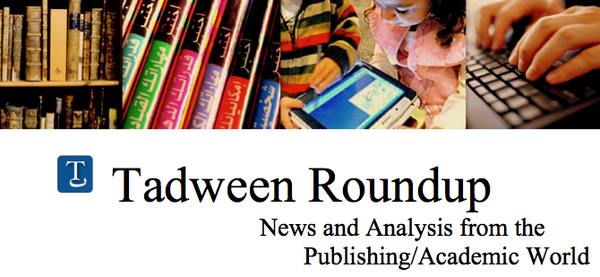Al-Diwan Roundup: News and Analysis from Publishing and Academia

Al-Diwan brings you the latest news and analysis from the publishing and academic worlds that relate to pedagogy and knowledge production.



 Tadween Publishing brings you the latest news and analysis from the publishing and academic worlds that relate to pedagogy and knowledge production.
Tadween Publishing brings you the latest news and analysis from the publishing and academic worlds that relate to pedagogy and knowledge production.

News and stories with a focus on the publishing industry, education, and technology from across the Arab world.











Tadween Publishing brings you the latest news and analysis from the publishing and academic worlds that relate to pedagogy and knowledge production.

News and stories with a focus on the publishing industry, education, and technology from across the Arab world.

Tadween Publishing brings you the latest news and analysis from the publishing and academic worlds that relate to pedagogy and knowledge production.

Tadween Publishing brings you the latest news and analysis from the publishing and academic worlds that relate to pedagogy and knowledge production.

News and stories with a focus on the publishing industry, education, and technology from across the Arab world.

By Steven Gertz
I now know what it is like to be profiled.
As an American white male of German descent, this is not something to which I am accustomed. For years, I have flown internationally with very little problem going through passport control (though Israel has been wary of my travels in the West Bank of Palestine). I have stood in numerous lines, smiled at customs officers, answered a few perfunctory questions (that I would wager tell customs officers very little about the passenger actually traveling) and been waived through with the desired stamp.

Tadween Publishing brings you the latest news and analysis from the publishing and academic worlds that relate to pedagogy and knowledge production.
by Sarah Lynch
CAIRO – Images of burns shaped like handprints on bare women’s bodies didn’t last long at an art exhibit about sexual harassment last semester at the American University in Cairo. Outraged over the provocative prints, students demanded they be torn down.
The controversy was part of the point: To shock viewers into thinking about sexual harassment in this part of the world where the offense is often endemic.
“Sexual harassment is in the public sphere. It’s everywhere,” said
Heba Hesham, co-founder of Heya, a student-founded women’s rights
initiative that helped organize the exhibit.

Tadween Publishing brings you the latest news and analysis from the publishing and academic worlds that relates to pedagogy and knowledge production.
By Yasmin Moll, Emily McKee, Tessa Farmer, and Jessica Barnes
The Middle East is a region that is continuously in the news and frequently the focus of controversial, polarizing and sometimes virulent debate within both policy and media circles. Scholars working on the Middle East face a unique set of challenges in their teaching and research. What they have to say, and how they say it, is often subjected to intense scrutiny by those with vested political or ideological interests. Such extra-scholarly pressures can pose serious threats to academic freedom and exercising professional responsibility. In light of these circumstances, the Taskforce on Middle East Anthropology created a resource guide in 2006 titled Academic Freedom and Professional Responsibility after 9/11: A Handbook for Scholars and Teachers. The first edition of the handbook was based on ethnographic interviews with and research on academics working on the Middle East who have encountered obstacles in their teaching and scholarship.